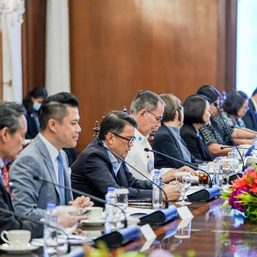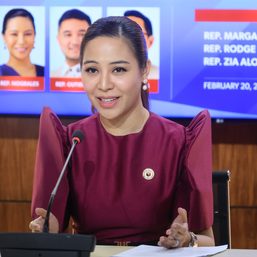SUMMARY
This is AI generated summarization, which may have errors. For context, always refer to the full article.
The House of Representatives gave its final nod to the bill extending the validity of President Rodrigo Duterte’s special powers to respond to the coronavirus crisis, including the use of a P162-billion standby fund valid until end-2020.
On Monday, August 10, a total of 242 lawmakers voted yes to House Bill No. 6953 or the Bayanihan to Recover as One Act during its 3rd and final reading.
Only the 6 legislators from the progressive Makabayan bloc voted against the bill. They are as follows:
- Carlos Zarate, Ferdinand Gaite, and Eufemia Cullamat, Bayan Muna
- Arlene Brosas, Gabriela Women’s Party
- France Castro, ACT Teachers
- Sarah Elago, Kabataan
No lawmaker abstained from the vote.
The measure, dubbed Bayanihan 2, provides a comprehensive list of 64 “interventions” that the executive branch is expected to undertake to beef up its response to the pandemic.
These include setting a COVID-19 testing protocol for vulnerable sectors, as well as providing aid to those in the transport and tourism industries critically affected by the crisis.
The 64 interventions adopted the 30 special powers that the first Bayanihan law originally granted to Duterte.
The House version would allot P162 billion – sourced primarily from off-budget government savings and tax collections – to fund the Duterte government’s programs aimed at combating COVID-19.
The Senate version, however, sets the amount at only P140 billion because the Department of Finance said the government cannot fund anything more that.
Both chambers also set different dates for the expiry of Bayanihan 2: September 30 for the Senate and December 31 for the House.
This means a bicameral conference committee would have to be convened so contingents from both chambers can reconcile the conflicting provisions in their respective Bayanihan 2 bills.
The bicam is expected to meet later this week.
Speaker Alan Peter Cayetano addressed the plenary before Bayanihan 2’s approval, describing the bill as a “living piece of legislation” that would “revitalize” sectors severely affected by the pandemic.
He said Bayanihan 2 primarily aims to help those in the agriculture, tourism, and manufacturing sectors get back on their feet.
“Bayanihan 2 is more than just an enumeration of benefits to certain sectors. It is a reaffirmation of the spirit of cooperation [and] community our race is famous for,” Cayetano said.
He previously said he wants the Duterte government to turn provinces into “new centers of development” to help the country recover from the crippling COVID-19 pandemic.
Bayan Muna’s Zarate, also one of the House’s deputy minority leaders, doubts Bayanihan 2 would boost the Duterte government’s strategy to fight the pandemic, with COVID-19 cases in the country totaling over 129,000 as of Sunday, August 9.
The progressive lawmaker said increasing the funds would not work if the Philippines is still not conducting mass testing and swift contact tracing of suspected cases. (READ: Pandemic unravels Duterte’s 2016 promise of decisive leadership)
“Until now, the government has not yet put in place an effective contact tracing strategy, and our entire healthcare system is on the brink of collapse. So why enact another version of a law when the first one has not been fully used or utilized for its intended purposes?” asked Zarate.
He then warned that Malacañang may just end up taking advantage of the multibillion-peso fund under Bayanihan 2.
“This will just concentrate more power and funds to Malacañang. Worse, it may even be funneled to also fund the campaign kitty of Malacañang’s allies for the upcoming elections,” Zarate said.
Aid for various sectors
Both the House and the Senate versions of Bayanihan 2 would provide a one-month emergency subsidy to qualified low-income households who were not able to get the first tranche of cash aid granted to 18 million families.
The bills would also direct government financial institutions to provide loans, subsidies, discounts, and grants for the purchase of electronic gadgets as schools shift to distance learning.
Displaced workers – including probationary, contractual, and casual workers – would also be given unemployment or involuntary separation assistance worth P10,000. Teaching and non-teaching personnel would also be granted one-time cash assistance worth P10,000.
Students who are not receiving any educational subsidy from the government but who are now facing financial difficulties due to the pandemic would also receive tuition subsidy.
In the House version, the P162-billion standby fund for COVID-19 response is broken down as follows:
- P10 billion: Subsidy for the National Health Insurance Program of the Philippine Health Insurance Corporation for the country’s expanded COVID-19 testing capacity
- P10.5 billion: For hiring of additional healthcare workers, arrangements for their risk allowance, life insurance, compensation, and compensation for death and critical illness
- P3 billion: Purchase of personal protective equipment sets for frontliners and indigents
- P4 billion: Construction of quarantine facilities
- P20 billion: Cash-for-work-programs
- P51 billion: Infusion of new capital for government financial institutions
- P20 billion: Low-interest credit for the agriculture sector
- P 10 billion: Department of Transportation’s assistance to critically impacted businesses in the transport industry
- P10 billion: Financing for the programs of the Tourism Infrastructure and Enterprise Zone Authority
- P100 million: Fund for training and subsidies for tourist guides
- P3 billion: Assistance to state universities and colleges (SUCs) to develop smart and IT-ready facilities
- P600 million: Subsidies for qualified students in both public and private elementary, secondary, and tertiary educational institutions
- P300 million: Subsidies for teaching and non-teaching personnel in both public and private elementary, secondary, and tertiary educational institutions
- P1 billion: Funding for the subsidy programs of the Department of Social Welfare and Development
- P4 billion: Assistance to the Department of Education to prepare schools for digital education
- P1.5 billion: Assistance to local government units
- P180 million: Allowances for national athletes and coaches whose allowances were reduced by half during the pandemic
- P820 million: Additional funds for the Department of Foreign Affairs’ programs for displaced migrant workers
– Rappler.com
Add a comment
How does this make you feel?


![[Time Trowel] Evolution and the sneakiness of COVID](https://www.rappler.com/tachyon/2024/02/tl-evolution-covid.jpg?resize=257%2C257&crop=455px%2C0px%2C1080px%2C1080px)





![[OPINION] The First Mode conundrum](https://www.rappler.com/tachyon/2024/03/tl-first-mode-conundrum-03232024.jpg?resize=257%2C257&crop=283px%2C0px%2C720px%2C720px)

There are no comments yet. Add your comment to start the conversation.